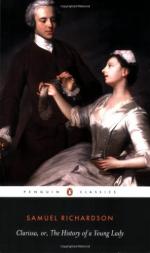A.H.
LETTER XXXVIII
Mrs. Harlowe, to Mrs. Howe
sat. July 22.
DEAR MADAM,
I send you, enclosed, copies of five letters that have passed between Miss Howe and my Arabella. You are a person of so much prudence and good sense, and (being a mother yourself) can so well enter into the distresses of all our family, upon the rashness and ingratitude of a child we once doated upon, that, I dare say, you will not countenance the strange freedoms your daughter has taken with us all. These are not the only ones we have to complain of; but we were silent on the others, as they did not, as these have done, spread themselves out upon paper. We only beg, that we may not be reflected upon by a young lady who knows not what we have suffered, and do suffer by the rashness of a naughty creature who has brought ruin upon herself, and disgrace upon a family which she had robbed of all comfort. I offer not to prescribe to your known wisdom in this case; but leave it to you to do as you think most proper. I am, Madam,
Your most humble servant,
Charl. Harlowe.
LETTER XXXIX
Mrs. Howe [in answer.] Sat. July 22.
DEAR MADAM,
I am highly offended with my daughter’s letters to Miss Harlowe. I knew nothing at all of her having taken such a liberty. These young creatures have such romantic notions, some of live, some of friendship, that there is no governing them in either. Nothing but time, and dear experience, will convince them of their absurdities in both. I have chidden Miss Howe very severely. I had before so just a notion of what your whole family’s distress must be, that, as I told your brother, Mr. Antony Harlowe, I had often forbid her corresponding with the poor fallen angel —for surely never did young lady more resemble what we imagine of angels, both in person and mind. But, tired out with her headstrong ways, [I am sorry to say this of my own child,] I was forced to give way to it again. And, indeed, so sturdy was she in her will, that I was afraid it would end in a fit of sickness, as too often it did in fits of sullens.
None but parents know the trouble that children give. They are happiest, I have often thought, who have none. And these women-grown girls, bless my heart! how ungovernable!
I believe, however, you will have no more such letters from my Nancy. I have been forced to use compulsion with her upon Miss Clary’s illness, [and it seems she is very bad,] or she would have run away to London, to attend upon her: and this she calls doing the duty of a friend; forgetting that she sacrifices to her romantic friendship her duty to her fond indulgent mother.




